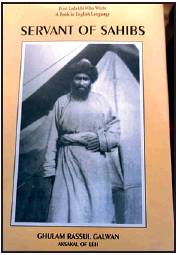Galwan Valley
This is a collection of articles archived for the excellence of their content. |
Attacks by China
Early 1900s
Rohan Dua, June 19, 2020: The Times of India

From: Rohan Dua, June 19, 2020: The Times of India
Days after the India-China face-off in Galwan river valley, the family of Ladhakhi writer and explorer Ghulam Rasul Galwan — from whom the valley gets its name — recalled another brutal encounter on the same land, this one a century ago, that their ancestor had with Chinese soldiers during an expedition in the 1900s.
“It pains us that more than 100 years on, Chinese transgressions have continued. Galwan Valley is named after my great-grandfather who bravely fought the Chinese and lived to tell the tale,” Manzoor, the author’s great-grandson, told TOI from his home in Leh’s Yourtung on Thursday. Galwan’s grandson, Amin, a 65-year-old retired government servant, recalled the Chinese attack mentioned in his grandfather’s autobiography ‘Servant of Sahibs: Asakal of Leh’. He said: “My grandfather had taken along sahibs (as British were called then) for an expedition near the valley in the early 1900s when there were several instances of Chinese soldiers beating them up. One day, there was news of another attack and armed with sticks my grandfather and a few others ran after four Chinese soldiers on horses. When they were on their way back to camp, some Chinese men attacked them brutally. They managed to flee and hide in a house for some time but when they came out, the Chinese encircled them. It was only when my grandfather feigned death that they left.” Galwan lay there until some British men came to his rescue several hours later. It’s his tales of exploration and courage that are often cited in the region. Galwan’s journey from a porter to an ‘aksakal’ or assistant to the then British joint commissioner at Leh is recorded in gazetteers.
Amin said his grandfather was born in 1878 in Leh and worked as a guide for the British in Tibet, the mountains of central Asia — especially the Karakoram Range — when he was barely 12. It was a time when the British were anxious about Russian expansion with an eye on Tibet. Galwan guided troops through the hostile territory and gathered intelligence about Russian plans that could compromise British interests in India. Tahir, another one of his greatgrandsons, said “It’s time that we give a strong push to Indian brands. The Galwan valley will always remain ours.”